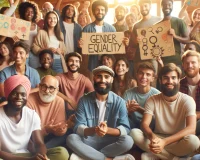Gender-Based Violence (GBV) is not just a violation of human rights; it is a public health crisis with profound and lasting effects on mental health and well-being. In Akwa Ibom State, like in many parts of the world, survivors of GBV face unique challenges that require urgent attention from individuals, communities, and policymakers.
Understanding the Mental Health Impact
GBV affects mental health in ways that are both immediate and long-term. Survivors often experience a wide range of psychological effects, including:
- Post-Traumatic Stress Disorder (PTSD): Constant flashbacks, nightmares, and hypervigilance are common symptoms among survivors. These symptoms can make it difficult for them to regain a sense of safety and normalcy.
- Depression: Many survivors struggle with feelings of sadness, hopelessness, and a lack of interest in activities they once enjoyed. Depression can be exacerbated by societal stigma or lack of support.
- Anxiety: Persistent fear and worry, often triggered by the trauma, can disrupt daily life. Survivors may feel unsafe in familiar environments or around certain people.
- Suicidal Thoughts: The overwhelming burden of trauma can lead some survivors to contemplate or attempt suicide, highlighting the critical need for timely intervention.
- Substance Abuse: As a coping mechanism, some survivors turn to alcohol or drugs, which can further complicate their recovery process.
The Ripple Effect on Well-being
The impact of GBV extends beyond the individual survivor. Families, communities, and workplaces are often affected as well. Survivors may face:
- Social Isolation: Stigma and victim-blaming discourage many survivors from seeking help, pushing them into isolation.
- Physical Health Problems: Chronic pain, sexual health issues, and other physical symptoms often accompany the psychological toll of GBV.
- Economic Impact: Survivors may lose their jobs or face difficulties in maintaining employment due to mental health struggles.
The Case for Holistic Support
To address the mental health impact of GBV, a multifaceted approach is needed:
- Access to Counseling and Therapy: Trained mental health professionals can help survivors process their trauma and develop coping strategies.
- Community Support Programs: Safe spaces where survivors can share their experiences without fear of judgment are essential.
- Education and Awareness Campaigns: Teaching communities about the impact of GBV can reduce stigma and encourage collective action.
- Strengthening Legal Protections: Ensuring survivors have access to justice and safety can alleviate feelings of helplessness and fear.
- Support for Children of Survivors: GBV impacts children who witness it, making it crucial to provide them with psychological support as well.
A Call to Action in Akwa Ibom State
The Akwa Ibom State Government has already taken significant steps to address GBV, including the implementation of the Violence Against Persons Prohibition Act (VAPP). However, more needs to be done to integrate mental health support into GBV intervention programs.
By fostering partnerships with mental health professionals, NGOs, and community leaders, we can create a network of care that prioritizes the well-being of survivors. Together, we can break the cycle of violence and help survivors rebuild their lives.
Conclusion
GBV’s impact on mental health and well-being is profound and far-reaching. Recognizing and addressing this issue is essential for building a society where everyone feels safe, valued, and supported. Let us commit to being part of the solution by advocating for mental health services, spreading awareness, and showing compassion to those affected.






